Most of us often tend to believe that introverts, empaths, HSPs, and old souls are the same. Although they do share some common traits, these personality types are all unique and have different personality traits.

1. Introverts
Introversion is a personality type that was made popular by psychologist Carl Jung in the 1920s. Introverts are people who prefer to spend time alone. Introverts feel mentally and emotionally drained when they attend a social gathering. Solitude helps introverts to recharge their energy as they feel “more comfortable focusing on their inner thoughts and ideas, rather than what’s happening externally,” explains WebMD.

According to an article in Healthline, “An introvert is often thought of as a quiet, reserved, and thoughtful individual.” Introverts usually do not look for attention from others as they thrive in their rich inner worlds.
Author Kendra Cherry, MS says “People who are introverted tend to be inward turning, or focused more on internal thoughts, feelings, and moods rather than seeking out external stimulation.” Introverts are the polar opposites of extroverts.
Related: Why Socializing For Introverts Is Exhausting, According To Science
Personality traits of introverts
Here are a few common personality traits you can find in every introverted person:
- Introverts need alone time
- Introverts find social interactions exhausting
- Introverts are reflective & self-aware
- Introverts have a small circle of close friends
- Introverts are curious and introspective
- Introverts have vivid imaginations and daydream
- Introverts prefer to write than talk
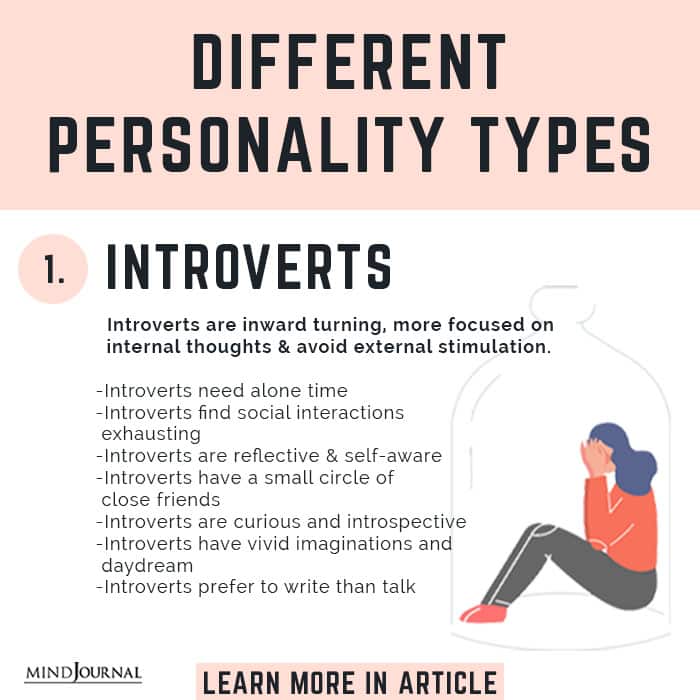
Understanding introverts
It has been observed that around 25% to 40% of the global population are introverts. Moreover, according to a random sample by the Myers-Briggs organization, it was found that 50.7% of the US population are introverts.
The brains of introverts work differently than the brains of extroverts. It has been found that introvert brains react differently to the hormone dopamine, which activates the reward- and pleasure-seeking areas of the brain.
Kendra adds “Introverts are those that have naturally high levels of arousal. Because introverts tend to experience chronically high arousal levels, they tend to seek activities and environments where they can escape from overstimulation.”
Related: 11 Advantages Of Being An Introvert
2. Empaths
Empaths tend to be sensitive individuals who are capable of sensing what others think and feel. According to psychology, empaths experience remarkable doses of empathy which enables them to absorb the emotions and feelings of others, whether it is positive or negative.
However, psychics believe that empaths possess certain spiritual or extrasensory abilities that allow them to sense others’ emotions and energies.
Author Judith Orloff, M.D. explains “The trademark of an empath is that they feel and absorb other people’s emotions and/or physical symptoms because of their high sensitivities. They filter the world through their intuition and have a difficult time intellectualizing their feelings.”
Licensed therapist Kim Egel says “Empaths have a higher sensitivity to outside stimuli such as sounds, big personalities, and hectic environments. They bring a lot of heart and care to the world and feel things very deeply.”
Related: The 5 Powers Of Empaths
Personality traits of empaths
Here are a few personality traits that are commonly found in almost every empath:
- Empaths are highly sensitive & intuitive
- Empaths absorb others’ emotions & energies
- Empaths are introverted
- Empaths have a hard time setting boundaries
- Empaths replenish in nature
- Empaths fall prey to energy vampires
- Empaths have difficulty coping with sensory & emotional overload
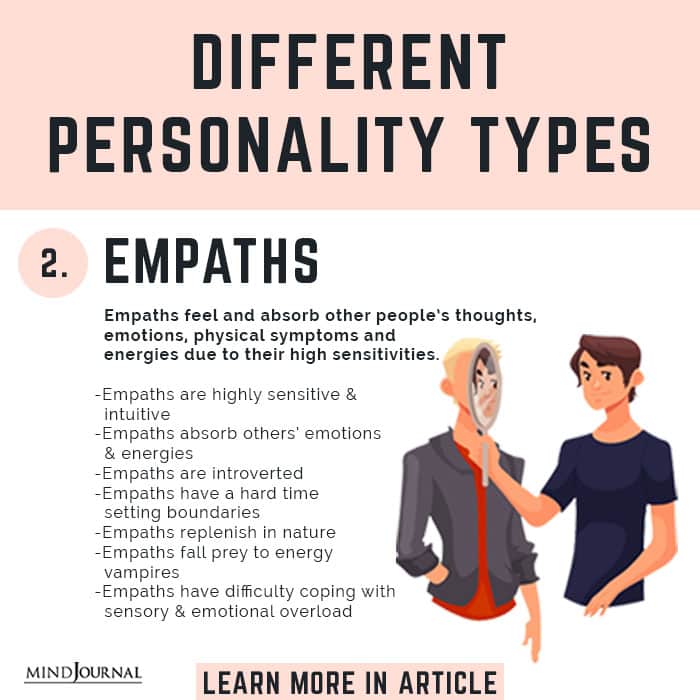
Understanding empaths
According to research, around 1% to 2% of the global population are empaths. Moreover, around 30% of the population experience Mirror-touch synaesthesia or Mirror-pain synaesthesia.
Although science has extensively studied the feeling of empathy, there is still little known about what makes empaths feel so much. However, research reveals that “empaths likely have hyper-responsive mirror neurons – the group of brain cells responsible for triggering feelings like compassion.”
This can make an empath feel specifically sensitive to certain electromagnetic fields that are generated by another person’s heart and brain. Hence, the empath can intuit the thoughts and emotions experienced by people around them.
As empaths tend to feel overwhelmed easily, they are more prone to experience stress, anxiety, fatigue, panic attacks and depression. This happens as they are often unable to distinguish someone else’s feelings from their own.
Related: 4 Secrets For Empaths to Slow Down
3. Highly Sensitive People
A highly sensitive person or an HSP has a particular personality trait known as sensory-processing sensitivity (SPS). Hence, highly sensitive people tend to show increased reactivity and emotional sensitivity towards both internal and external stimuli like loud noises, strong lights, pain and hunger. They are also more prone to have complex inner lives.
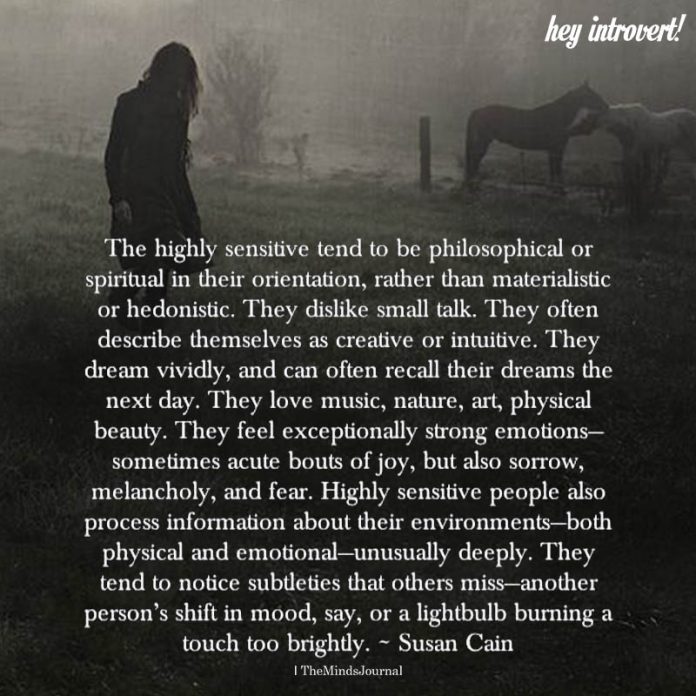
Wellness coach Elizabeth Scott, MS explains that HSPs “have an increased or deeper central nervous system sensitivity to physical, emotional, or social stimuli.” Although being labeled as highly sensitive or being too sensitive is mostly seen as a negative thing, it is not necessarily negative.
This personality trait has both positive and negative aspects that are unique to HSPs. “If you know how to manage the unique features of being an HSP, you can make it more of a strength and less of a challenge in your life,” Elizabeth adds.
Related: The 8 Types of HSP: What Type Of A Highly Sensitive Person Are You?
Personality traits of HSPs
Some of the most common personality traits of a highly sensitive person are:
- HSPs feel more deeply and are easily overwhelmed
- HSPs are more emotionally reactive & cry more easily
- HSPs can’t perform when under observation
- HSPs are extremely detail-oriented
- Not all HSPs are are introverts. 30% are extroverts
- HSPs are more prone to anxiety & depression
- HSPs avoid noisy environments & violent media
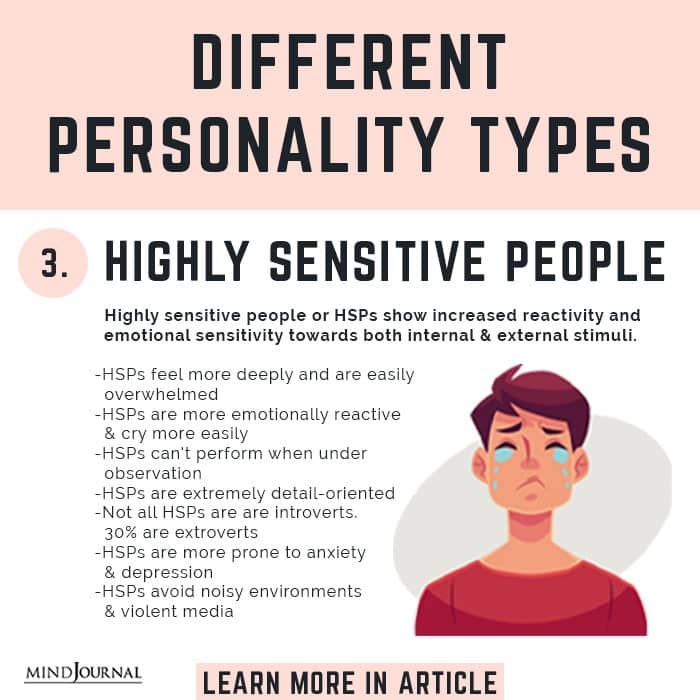
Understanding HSPs
It has been observed that around 15% to 20% of the population are HSPs. However, psychologist and author Dr. Elaine Aron believes that around 20% to 30% of the population “have a highly attuned nervous system that deeply processes information both within and around them.”
According to studies by Dr. Aron, HSPs have an innate trait known as Sensory Processing Sensitivity that is found equally in both men and women. This enables the brain and nervous system of HSPs to process finer and subtle details that most others generally miss out on.
Although it was considered as an evolutionary tool designed to save our lives, now in the modern world, it is considered a burden which can overstimulate and overwhelm an HSP.
The brain of an HSP has a highly active insula, which enables to increase perception and self-awareness. Moreover, their brains are also weird in a way that allows them to stop and think before they act. Hence, they tend to be deep thinkers and slower decision-makers.
Research also shows that brain scans of sensitive individuals reveal highly active mirror neurons that regulate feelings of empathy and emotional responses.
Related: Are you an HSP? 10 Ways To Know If You Are Highly Sensitive
4. Old Souls
An old soul is someone who is wiser than their appearance or age. They tend to have a better understanding and appreciation of things that are mostly ignored by others. They often have a unique perspective and approach towards life. Old souls often prefer the charm of the bygone era over the rush of modern life. They have a greater sense of knowledge & inner wealth.

“On the simplest definition, old souls are people who have had many different lives. This is often regardless of if they can actively recall those previous incarnations of themselves or not,” explains author and LOA expert Katherine Hurst.
She adds that old souls are often disconnected from the material realm and possess an innate level of understanding. Life coach and author Weston Jolly writes “There is a definite spirituality to old souls that is hard to ignore.
Commonly, old souls tend to be very powerful but generally tend to be more quiet or introspective. There is a desire to connect within which can be misinterpreted as their being aloof or not paying attention.”
Related: 7 Signs You Are an Old Soul
Personality traits of old souls
Here are some of the most common personality traits you can find in an old soul:
- Old souls seek knowledge and wisdom
- Old souls strive for personal and spiritual growth
- Old souls are highly intuitive & great listeners
- Old souls are not materialistic & cherish nature
- Old souls reject the latest trends or the mainstream
- Old souls are deep thinkers
- Old souls appreciate the interconnectedness of our universe
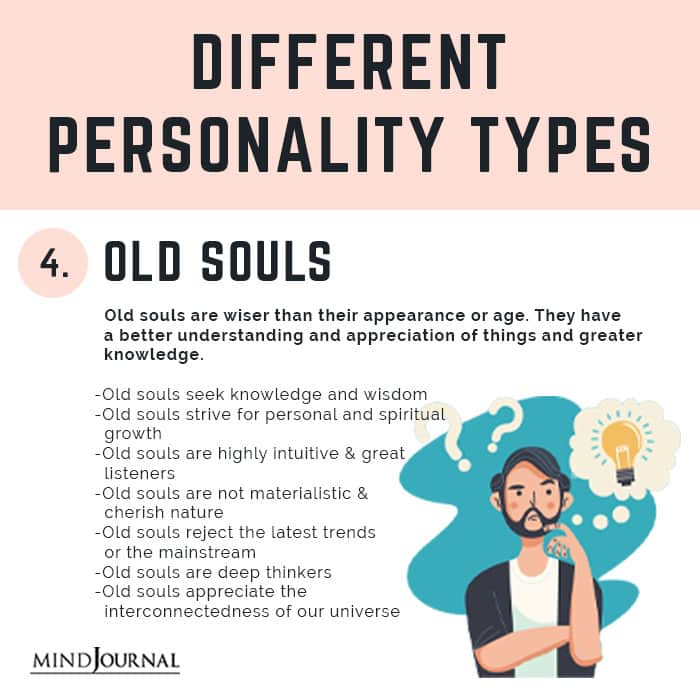
Understanding old souls
Being an old soul has nothing to do with the age of an individual. Clinical psychologist Carla Marie Manly, PhD explains “When we talk about ‘old souls’ in the realm of psychology, we are often referring to those individuals who seem to have inherent wisdom and a grounded sense of being in the world – often far more than would be expected for someone their age.”
In terms of personality, an old soul may be an introvert or an empath. They are usually self-assured and self-reflective. Dr. Manly says “Many people are drawn to old souls, for they radiate a sense of peacefulness and inner strength that is captivating and reassuring.”
Related: Emotional Frequency: Why Are So Many Old Souls Empaths?
Are Introverts, Empaths, Highly Sensitive People And Old Souls The Same?
As evident, introverts, empaths, highly sensitive people and old souls have distinct characteristic traits and unique strengths and weaknesses that make them very different from one another. However, they do tend to share some similarities and often certain personality traits do overlap.
Empaths tend to share most of the traits of HSPs including need for alone time, high sensitivity, aversion towards crowds and a low threshold for stimulation, explains author Judith Orloff M.D.
She writes “Highly sensitive people are typically introverts, while empaths can be introverts or extroverts (although most are introverts). Empaths share a highly sensitive person’s love of nature and quiet environments, their desire to help others, and their rich inner life.” But HSPs do not absorb the emotions and energies of others like empaths do.
Moreover, many empaths also claim to be old souls. Author and psychospiritual teacher Mateo Sol explains that old souls are highly sensitive to spiritual energy and can often sense the energies in others. He writes “This doesn’t mean that all Old Souls are Empaths, but it does mean that many can easily become spiritually attuned to the living energy around them.”
Related: The Difference Between Empaths and Highly Sensitive People
We Are All Unique And Similar
All these personalities and traits are a gift. We are who we are for a special reason. Although each of us is unique, we do share a lot of the same personalities that enable us to connect and relate with each other on an emotional and spiritual level.
Our personality traits give us the strength to share our gifts with the world and help those who need our support, and in the process help ourselves to be our best version. So irrespective of whether you are an introvert, an empath, an HSP, or an old soul, the important thing is you find yourself and use your natural talents to live your best life.
Related: 6 Traits Of A Deep Thinker


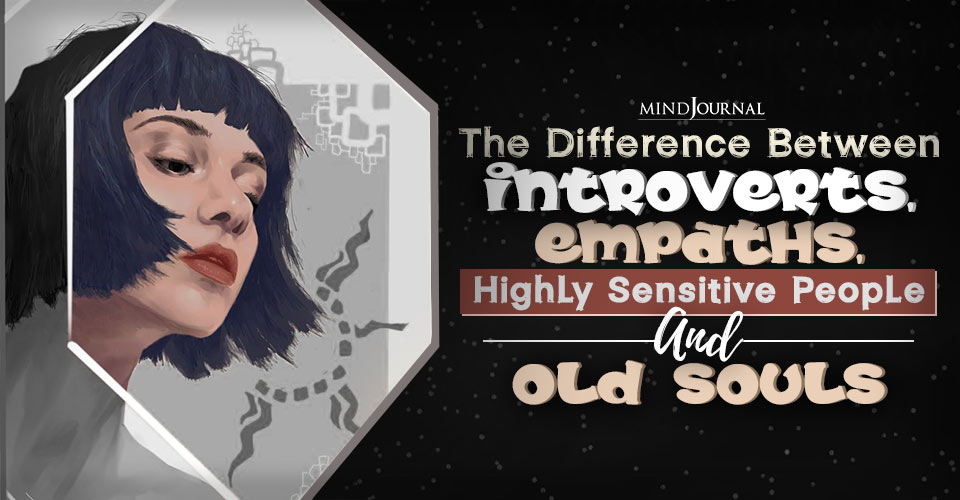



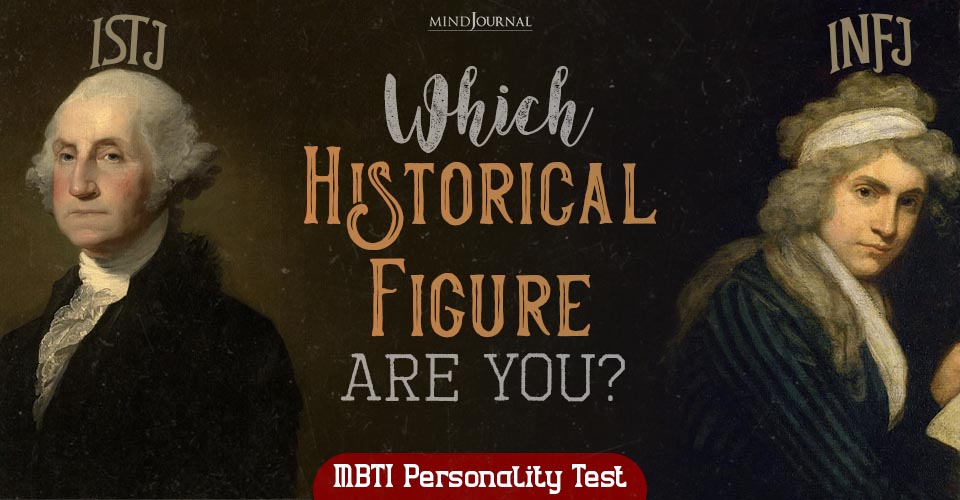

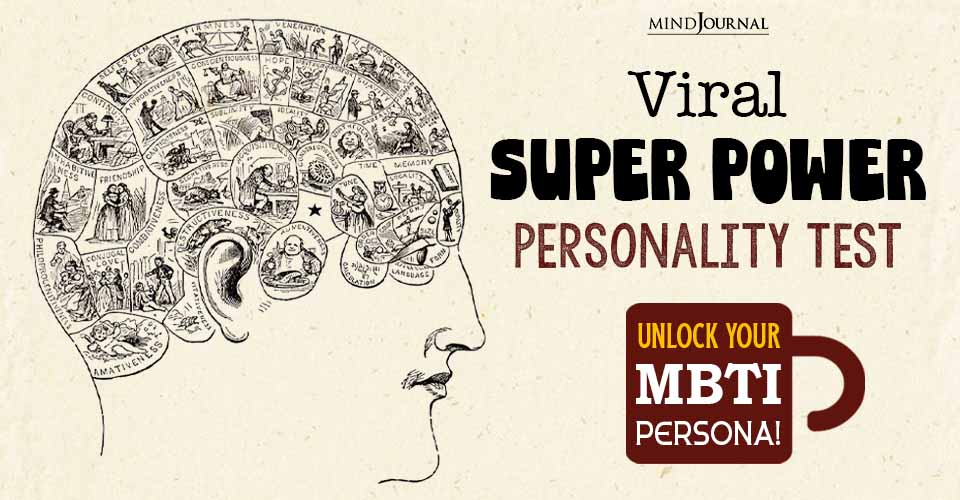

Leave a Reply